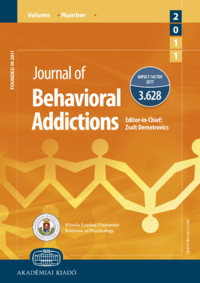Assessing ICD-11 gaming disorder in adolescent gamers by parental ratings: Development and validation of the Gaming Disorder Scale for Parents (GADIS-P)
Assessing ICD-11 gaming disorder in adolescent gamers by parental ratings: Development and validation of the Gaming Disorder Scale for Parents (GADIS-P)
Author(s): Kerstin Paschke, Maria Isabella Austermann, Rainer ThomasiusSubject(s): Behaviorism
Published by: Akadémiai Kiadó
Keywords: gaming disorder; ICD-11; adolescents; parents; screening
Summary/Abstract: Background and aims. The addiction to digital games is associated with substantial impairments in daily functioning and adolescents are particularly at risk. Screening instruments for the new ICD-11 diagnosis Gaming Disorder (GD) are rare and only include self-ratings thus far. Since adolescents' insight might be limited due to young age or symptom denial, external ratings are essential. We therefore aimed to develop and validate the Gaming Disorder Scale for Parents (GADIS-P) in a representative sample of parents and young gamers. Methods. GADIS-P was developed as an adaptation of a recently published self-rating scale. It was validated in 800 parents and their frequently gaming children between 10 and 17 years with standardized questionnaires in an online survey. Item structure was investigated by confirmatory factorial analysis. Gaming time, pathological gaming according to DSM-5, emotional dysregulation, and academic performance were used to derive criterion validity. Accordance with self-ratings was determined. ROC-Analyses were computed to determine cut-off values. Results. A presumed two-factorial structure of GADIS-P could be confirmed describing cognitive-behavioral symptoms and negative consequences. The instrument showed good to excellent internal consistency (Cronbach's α = 0.89–0.92, McDonald's ω = 0.92–0.95) and criterion validity with moderate to strong correlations regarding gaming behavior (r/ϱ = 0.35–0.76), excellent discriminatory power, and moderate accordance with the adolescents' self-ratings (kappa = 0.47–0.58). Discussion and conclusions. As the first successfully validated tool for the assessment of ICD-11 GD in adolescents by parental judgment, GADIS-P can make an important contribution to reliable GD screening in clinical and research settings.
Journal: Journal of Behavioral Addictions
- Issue Year: 10/2021
- Issue No: 1
- Page Range: 159-168
- Page Count: 10
- Language: English

